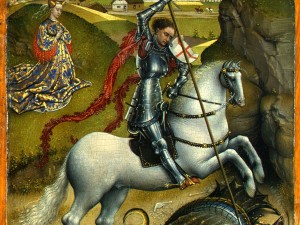Blog
Celebrate St. George’s Day Thursday, April 23
My English-born husband John has a campaign to get more recognition for St. George, the patron saint of England. To wit, this blog and the following short history of this heroic man and Christian martyr.
“Follow your spirit, and upon this charge cry ‘God for Harry, England and Saint George!’” So howls King Henry V at the climax of the great Harfleur speech in Shakespeare’s play. But who really was the St George that Prince Hal uses to so inspire his men?
But who was St George?
Scientists have haggled over the exact details of the birth of St George for hundreds of years but it is generally put at around 280AD. He was born in the town of Lydda, then in the Roman territory of Syria Palestina and in modern terms around 15 kilometres south of Tel Aviv to two Christian parents.
He went on to become one of the finest soldiers in the Roman army but, in AD 303, the Roman Emperor Diocletian issued an edict that every Christian soldier in the army should be arrested. George, it seems, wasn’t too happy about this and approached the emperor to renounce the edict.
Diocletian tried as hard as he could to convert the great soldier to worship of the Roman gods by offering him gifts of land, money and slaves. However, George stood strong and stolidly turned all of these down.
Diocletian realised he had no choice but to make the decision to have George horrifically tortured before being executed. The methods of torture apparently included laceration of wheel of swords before he was eventually decapitated. Not before George had donated his entire wealth to the poor though and, for the actions of his life, he was venerated as a Saint.
But why is George the Patron Saint of England?
The decision to make St George the patron saint of England was predominantly taken by the Plantagenet King Edward III, who reigned from 1327 to 1377. Edward was a big personal fan of the story of George apparently and thus decided to make the famous St George’s cross his military banner.
Under the banner, the English army won victories at Halidon Hill, Bannockburn and Crécy. It became quickly associated with English military success and, after the flag was carried at the battle of Agincourt in 1415, Saint George’s Day was made into a national feast day.





Gatlinburg Weather
Click for weather forecast